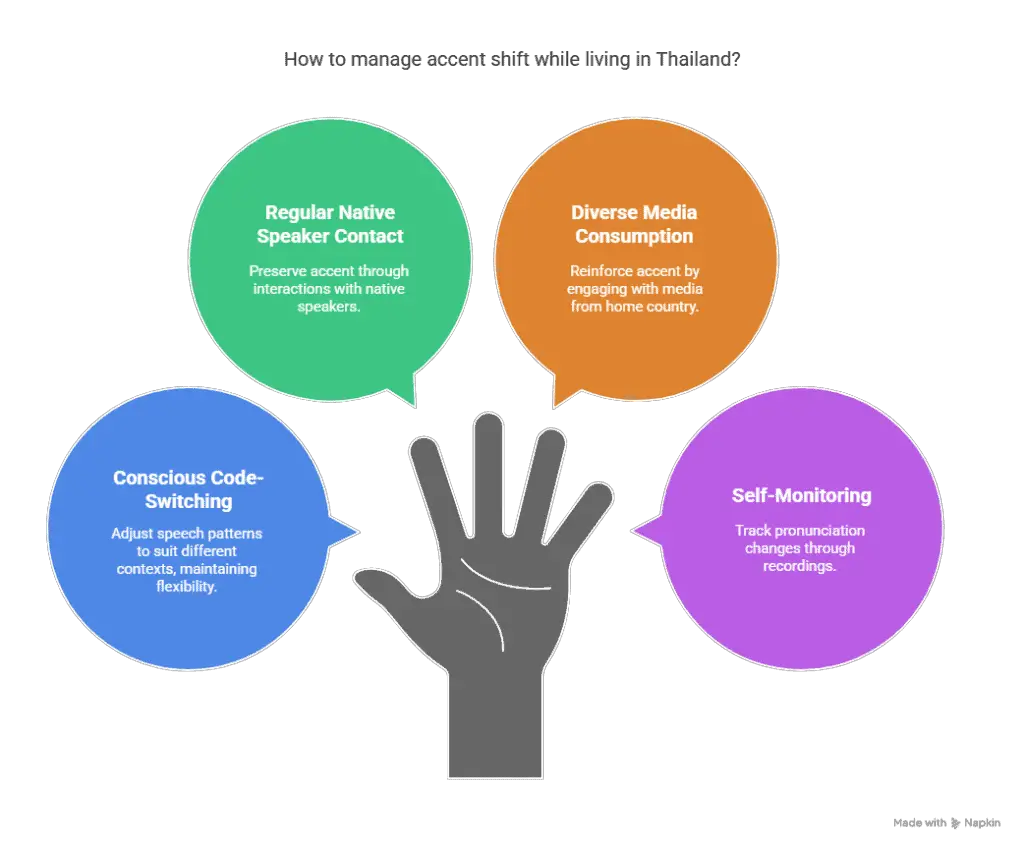The Thai English Accent Shift: How Thailand Changes Speeches
When I first moved to Thailand after 35 years in the United States, I never expected my English to change. But like many long-term expats, I’ve discovered that immersion in Thailand’s unique linguistic environment creates subtle but noticeable Thai English accent shifts. This phenomenon, which researchers call accent accommodation, affects expats worldwide and reveals fascinating insights about how our brains adapt to new communication environments.
Key Takeaways
- Long-term expats unconsciously adapt their English pronunciation patterns to match the local Thai English accent characteristics.
- Thai speakers face unique challenges with English pronunciation due to tonal language differences and simplified speech patterns.
- Living in Thailand creates a bidirectional accent shift affecting both English speakers learning Thai and native English pronunciation habits.
The Science Behind Language Adaptation

Living in Thailand means constant exposure to Thai English pronunciation patterns, and our brains naturally adapt to improve communication effectiveness. Thai-accented English exhibits distinct linguistic characteristics that can be observed in pronunciation patterns and speech features, and long-term exposure inevitably influences how we speak.
The linguistic foundation creates this shift. Thai is a tonal language whose syllables take approximately the same time to pronounce. Thai people often have difficulty with English word stress. As expats interact daily with Thai English speakers, we unconsciously begin accommodating these patterns to facilitate mutual understanding.
Thai vowels are distinguished by shortness and length, while for English, it is laxness and tenseness. This fundamental difference affects how Thai speakers perceive English sounds, creating what linguists call “Tinglish” – the distinctive blend that becomes our primary English communication medium in Thailand.
Understanding Thai English Pronunciation Patterns
To grasp why expats develop speech adaptations, we need to understand the specific challenges Thai speakers face. As some sounds in English do not exist in the Thai language, this affects the way native Thai speakers pronounce English words.
Common Thai English patterns include:
- R-L substitution where “rice” sounds like “lice”
- Simplified final consonants
- Modified consonant clusters
- Tonal influences on English intonation
Substitution of English sounds with similar Thai sounds: Thai learners may substitute English sounds that do not exist in Thai with similar sounds from their native language. Expats naturally begin accommodating these substitutions to bridge communication gaps.
The Expat Accommodation Phenomenon
What I’ve experienced isn’t unique. Long-term expats worldwide report similar accent shifts when living in non-English-speaking countries. This accommodation serves multiple purposes:
- Improved Communication: Speaking in patterns familiar to local English learners reduces misunderstandings
- Social Integration: Adapting speech patterns signals respect and cultural awareness
- Professional Effectiveness: Clearer communication enhances business and social relationships
- Unconscious Mimicry: Our brains naturally mirror the speech patterns of frequent conversation partners
The phenomenon extends beyond just pronunciation. Tinglish refers to any form of English mixed with or heavily influenced by Thai. It is typically produced by native Thai speakers due to language interference from their first language. Expats often find themselves adopting simplified grammar structures and vocabulary choices that facilitate understanding.
Regional Linguistic Complexity in Thailand
Thailand’s diverse linguistic landscape adds complexity to accent adaptation. Thai regional accents offer a wealth of cultural and linguistic diversity. From the melodious tones of the North to the rhythmic patterns of the South, each region has its distinct flavor.
Bangkok, as the capital city and center of fashion & modernization, any slang, variation spoken can be easily imitated by people from other parts of Thailand. This means expats in different regions may develop varying accent adaptations.
The tonal foundation creates unique challenges. All Thai syllables must have one of five tones (mid, low, falling, high, rising). English words adapted into Thai are systematically given these tones according to certain rules. Immersion in this tonal environment subtly influences how expats stress and intonate English words.
Professional and Social Implications
The Thai English accent shift carries real-world consequences for expat professionals. Research indicates that American accents were considered the most favorable and the standard for pronunciation. Although Asian English accents were also positively perceived as intelligible and acceptable, this suggests that accent adaptation can be strategically beneficial in regional contexts.
Understanding when and how to adjust speech patterns becomes crucial. International business settings may require different pronunciation approaches compared to local Thai training sessions or community interactions.
Practical Strategies for Managing Accent Shift
For expats concerned about maintaining communication flexibility while living in Thailand, several approaches prove effective:

Conscious Code-Switching: Develop awareness of different communication contexts and practice adjusting accordingly between natural accent and Thailand-adapted patterns.
Regular Native Speaker Contact: Maintain connections with people from your home country through video calls and conversations to preserve familiar pronunciation patterns.
Diverse Media Consumption: Continue engaging with films, podcasts, and news from your home country to reinforce native accent exposure.
Self-Monitoring: Record yourself speaking periodically to track pronunciation changes and maintain awareness of shifts.
The Bidirectional Nature of Language Change
What makes the Thai English accent shift fascinating is its bidirectional influence. While expats adapt their pronunciation, they simultaneously affect how Thai speakers approach English. I’ve found that if you say things the way a Thai says them, you’re universally understood. They just get it.
This creates dynamic linguistic environments where both groups modify speech patterns. Thai colleagues working with expats often develop clearer English pronunciation, while expats adopt simplified patterns, enhancing mutual comprehension.
The result is a unique International English form serving Thailand’s multicultural business and social needs. This represents language evolution responding to practical communicative requirements rather than degradation.
Linguistic Identity and Cultural Adaptation
Over time, I tended not to use slang and be more neutral in how I conversed with other expats, which in majority were British, plus over time, via association, started to adopt English language mannerisms. Our pronunciation changes become markers of expat journeys and cultural adaptation.
For many long-term expats, these modifications represent successful integration rather than linguistic loss. We develop abilities to communicate effectively across cultural and linguistic boundaries, demonstrating linguistic intelligence and cultural sensitivity.
Practical Communication Strategies
Understanding Thai regional accents is essential for effective communication and truly mastering the language. Similarly, understanding how our English evolves in Thailand’s linguistic environment helps us become more effective cross-cultural communicators.
Key strategies include:
- Developing awareness of pronunciation adaptations
- Practicing flexibility between communication contexts
- Recognizing accommodation as successful cultural integration
- Maintaining connections to original accent patterns when professionally necessary
Embracing Linguistic Flexibility
Rather than viewing accent shifts as problems, we can recognize them as evidence of successful cross-cultural communication. The ability to adapt speech patterns demonstrates linguistic intelligence and cultural awareness essential for thriving as expats in Thailand.
Understanding Thai regional accents is essential for effective communication and truly mastering the language. The Thai English accent shift reflects the beautiful complexity of language contact and human linguistic adaptability.
FAQs
Will my accent permanently change after living in Thailand?
How can I maintain my original accent while living in Thailand?
Is the Thai English accent shift harmful to communication?
Do all expats experience accent changes in Thailand?
Should I be concerned about my children’s accents if we live in Thailand?
Conclusion
The Thai English accent shift isn’t just a linguistic curiosity – it’s a window into how we adapt and evolve as global citizens. My pronunciation changes reflect years of meaningful cross-cultural communication and successful integration into Thai society. While I sometimes miss my original American drawl, I’ve gained something valuable: the ability to communicate effectively across cultures. If you’re considering a move to Thailand, let us help you embrace the linguistic journey ahead. Your accent might change, but your ability to connect with people from different backgrounds will grow exponentially.





![The Best Scenic Train Journeys Thailand [Must See!] Scenic Train Journeys Thailand](https://betterlivingasia.com/wp-content/uploads/ScenicTrainJourneysThailand4-768x511.jpg)
